Taiwanese food was always a significant part of Lisa Cheng Smith’s childhood in Texas, where she grew up in a multicultural household with a Taiwanese mother and American father.
In a metropolis like Houston, one of the most ethnically diverse cities in the US, their search for Taiwanese food never took long, and often ended in the kitchens of home cooks.
“It was easy because my mom had her own community, so we’d just go to her friend’s house and they’d be making zongzi (粽子),” Smith says, referring to the dumplings made of glutinous rice and fillings wrapped and cooked in leaves.
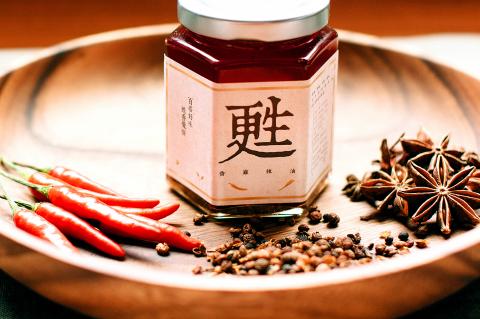
Photo courtesy of Su Spicy Chili Crisp
This early immersion among Taiwanese immigrants reproducing the food of their homeland came full circle in February this year, when Smith, now based in New York, opened Yun Hai Taiwanese Pantry (雲海). The online boutique offers a handpicked selection of gourmet foods made in Taiwan, and will soon occupy a retail space in Win Son Bakery in Brooklyn.
“My number one goal is to make ingredients and packaged foods and things like that available to home cooks,” says Smith, 36, who runs Yun Hai as a “passion project” alongside her full-time job as a wholesale director at a Danish design brand.
For now, the shop’s selection is intentionally limited. Smith works directly with just three small-batch producers that are able to meet her exacting standards for delicious Taiwanese condiments crafted with natural ingredients and methods.
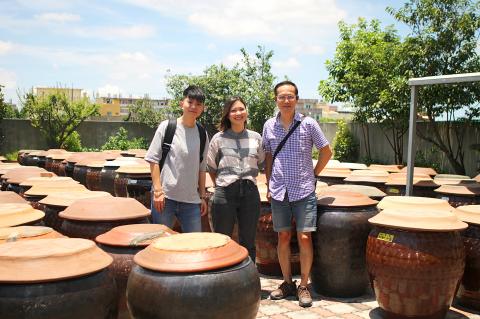
Photo: Davina Tham, Taipei Times
Take for example Su Spicy Chili Crisp (甦香麻辣油), made in Taipei. It is a fragrant and tingly crispy chili oil laced with Sichuan peppercorns, red chili peppers and star anise. It’s a connoisseur’s alternative to Lao Gan Ma (老乾媽) chili crisp, the almighty condiment from China’s Guizhou Province now almost as widely available in the US as it is here.
Yun Hai’s premise sounds straightforward, and it is. But Smith’s choice to focus on artisanal ingredients (inevitably costing more than mass-produced versions) and assertively identify them as Taiwanese (as opposed to Chinese) also means her business is at the forefront of an evolving cultural conversation around food, race and identity.
FANCY FOODS
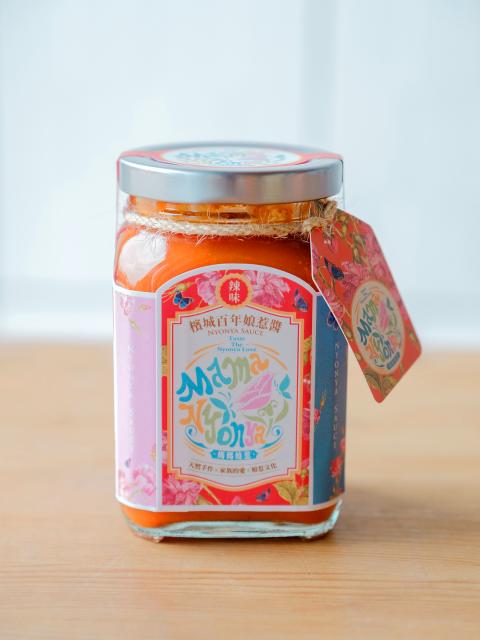
Photo courtesy of Mama Nyonya
While European fine foods abound in American groceries, their Asian equivalents can be elusive. Even when these are available, Smith says, most American consumers balk at paying a premium for high-quality Asian ingredients (with the notable exception of Japanese imports).
“I think the biggest challenge is convincing the public that products that are Chinese can and should cost more, because they’re so used to bottom-of-the-barrel prices,” Smith says. Among non-Asians, this thinking can be so ingrained that “there’s a whole discussion about, if it’s expensive, it’s not authentic,” she adds.
On a brief sourcing trip to Taiwan last month, Smith made sure to vet for authenticity. After touching base with her local operations team — consisting of Ivan Wu (伍摘虹), a peripatetic businessman, and his assistant Hsieh Wen-feng (謝文鳳), a young Changhua native — the trio made site visits to their producers.
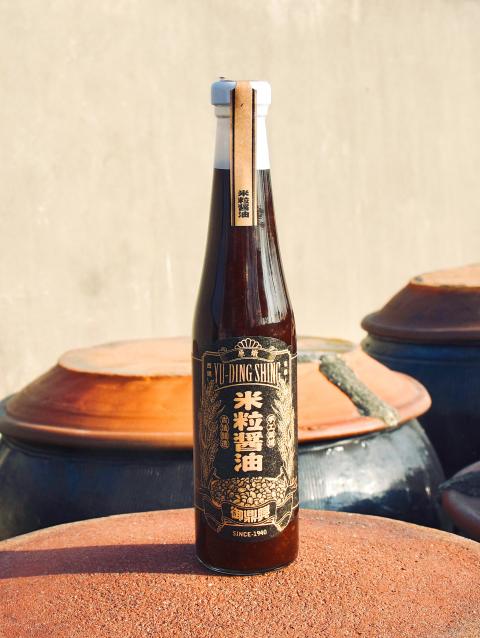
Photo courtesy of Yu Ding Shing
The most expensive item in Yun Hai’s inventory is a bottle of soy sauce made by the Hsieh (謝) family of Yu Ding Shing (御鼎興) brewery, which has operated in the agricultural heartland of Yunlin County for more than 60 years.
A visit confirms that the Hsiehs make their soy sauce in the laborious, time-tested way: using locally-grown, organic black soy beans; cooking the beans over wood fires; and fermenting them for at least six months in custom-made vats.
There is a general schema to soy sauce brewing, but vital decisions determining the taste of the final product — microbial cultures, ratios of salt and water and fermentation time, all adjusted for seasonal differences — are not cut and dried. There is no substitute for the keen judgment of an expert brewer, in this case second-generation soy sauce master Hsieh Yu-tu (謝裕讀), assisted by his two sons.
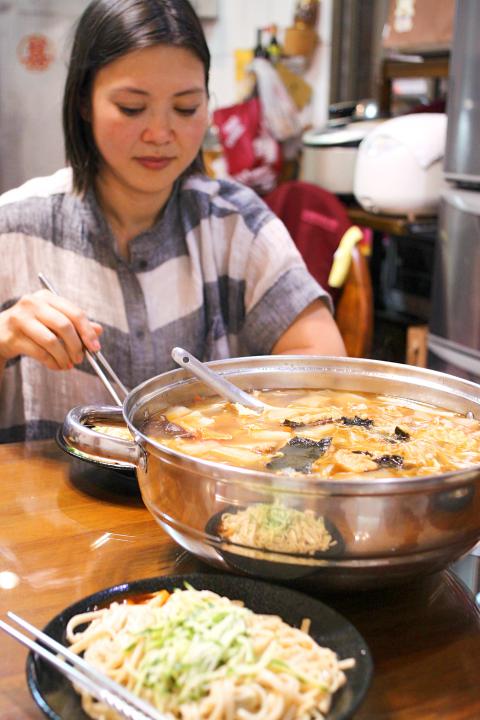
Photo: Davina Tham, Taipei Times
For all their efforts, a bottle of Yu Ding Shing’s specialty soy sauce retails for US$24 at Yun Hai.
“There’s already an inexpensive soy sauce option, and there should always be,” Smith says. But like European cheese and wine, Smith believes there is a market for sophisticated ingredients from non-white cuisines, strengthened by a societal shift toward sustainable and mindful consumption.
Early indicators appear to back this up. Yun Hai has not received any complaints about prices, only interest from food aficionados, including an editor at Bon Appetit and chefs at some of the most exciting Taiwanese restaurants in New York.
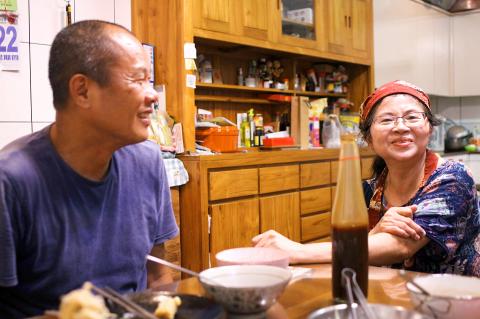
Photo: Davina Tham, Taipei Times
TAIWANESE TERROIR
Yun Hai is situated in a growing wave of culinary and creative initiatives that are reframing Asian cuisines and reclaiming their place on the American dining table.
Yet even then, Taiwanese food is caught in a particular double bind — it is implicated in racialized attitudes toward Asian cuisines in general, but also in Taiwan’s fraught political relationship with China.
Last month, an article in the New York Times noted the rise of a new crop of restaurants identifying their food as Taiwanese, distinct from Chinese. Smith herself is not coy about her political views and how they relate to her business.
“We intend to bring visibility to the culture, cuisine and independence of Taiwan while offering a selection of fine and fancy ingredients for Chinese cooking,” reads an introduction on Yun Hai’s Web site. “Terrain, technique, history and humanity come together in the traditional foods we distribute.”
As young members of the Taiwanese diaspora come into their own, they are forging a relationship with their heritage on their own terms. Finding beautiful and thoughtful products made here — often by young people like themselves — is one way.
“When they discover something that is new and has a story, it comes from a kind of genuine place, it feels like a connection, even if you’re not able to travel back [to Taiwan],” Smith says.
The concept of terroir applies here — Taiwan’s locality is not incidental to the foods, but an essential part of their character. And this character can sometimes reveal itself in surprising ways.
One of the more unexpected items available at Yun Hai is Nyonya Sauce (檳城百年娘惹醬), made according to a family recipe by a garlic grower in Changhua County. The vinegary, pungent chili sauce is an artefact of Peranakan cuisine, part of a hybrid culture that developed in Malaysia and Singapore hundreds of years ago, when Chinese immigrants settled and married into local Malay communities.
“I think people are surprised by that. But to me it’s typical. Taiwan’s such a melting pot of cultures,” Smith says.
For her, the faithful reproduction of a Peranakan condiment in Taiwan’s countryside is confirmation of the country’s diversity and openness.
“My whole feeling as a youth was, that was just always for me and my kind only,” Smith says of Taiwanese food. That makes it “very satisfying” to see the enthusiasm Yun Hai has inspired for Taiwanese craftsmanship.
■ The Yun Hai Taiwanese Pantry is online at www.yunhai.shop.

Dissident artist Ai Weiwei’s (艾未未) famous return to the People’s Republic of China (PRC) has been overshadowed by the astonishing news of the latest arrests of senior military figures for “corruption,” but it is an interesting piece of news in its own right, though more for what Ai does not understand than for what he does. Ai simply lacks the reflective understanding that the loneliness and isolation he imagines are “European” are simply the joys of life as an expat. That goes both ways: “I love Taiwan!” say many still wet-behind-the-ears expats here, not realizing what they love is being an

Google unveiled an artificial intelligence tool Wednesday that its scientists said would help unravel the mysteries of the human genome — and could one day lead to new treatments for diseases. The deep learning model AlphaGenome was hailed by outside researchers as a “breakthrough” that would let scientists study and even simulate the roots of difficult-to-treat genetic diseases. While the first complete map of the human genome in 2003 “gave us the book of life, reading it remained a challenge,” Pushmeet Kohli, vice president of research at Google DeepMind, told journalists. “We have the text,” he said, which is a sequence of

Every now and then, even hardcore hikers like to sleep in, leave the heavy gear at home and just enjoy a relaxed half-day stroll in the mountains: no cold, no steep uphills, no pressure to walk a certain distance in a day. In the winter, the mild climate and lower elevations of the forests in Taiwan’s far south offer a number of easy escapes like this. A prime example is the river above Mudan Reservoir (牡丹水庫): with shallow water, gentle current, abundant wildlife and a complete lack of tourists, this walk is accessible to nearly everyone but still feels quite remote.

It’s a bold filmmaking choice to have a countdown clock on the screen for most of your movie. In the best-case scenario for a movie like Mercy, in which a Los Angeles detective has to prove his innocence to an artificial intelligence judge within said time limit, it heightens the tension. Who hasn’t gotten sweaty palms in, say, a Mission: Impossible movie when the bomb is ticking down and Tom Cruise still hasn’t cleared the building? Why not just extend it for the duration? Perhaps in a better movie it might have worked. Sadly in Mercy, it’s an ever-present reminder of just